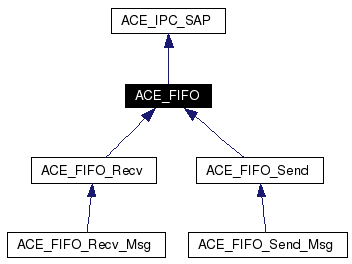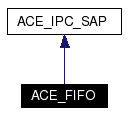
#include <FIFO.h>
Inheritance diagram for ACE_FIFO:


Public Member Functions | |
| int | open (const ACE_TCHAR *rendezvous, int flags, mode_t perms, LPSECURITY_ATTRIBUTES sa=0) |
| int | close (void) |
| Close down the ACE_FIFO without removing the rendezvous point. | |
| int | remove (void) |
| int | get_local_addr (const ACE_TCHAR *&rendezvous) const |
| Return the local address of this endpoint. | |
| void | dump (void) const |
| Dump the state of an object. | |
Public Attributes | |
| ACE_ALLOC_HOOK_DECLARE | |
| Declare the dynamic allocation hooks. | |
Protected Member Functions | |
| ACE_FIFO (void) | |
| Default constructor. | |
| ACE_FIFO (const ACE_TCHAR *rendezvous, int flags, mode_t perms, LPSECURITY_ATTRIBUTES sa=0) | |
Private Attributes | |
| ACE_TCHAR | rendezvous_ [MAXPATHLEN+1] |
| Rendezvous point in the file system. | |
UNIX FIFOs are also known Named Pipes, which are totally unrelated to Win32 Named Pipes. If you want to use a local IPC mechanism that will be portable to both UNIX and Win32, take a look at the <ACE_SPIPE_*> classes.
Definition at line 39 of file FIFO.h.
|
|
Default constructor.
Definition at line 59 of file FIFO.cpp.
00060 {
00061 // ACE_TRACE ("ACE_FIFO::ACE_FIFO");
00062 }
|
|
||||||||||||||||||||
|
Open up the named pipe on the in accordance with the flags. Definition at line 49 of file FIFO.cpp. References ACE_ERROR, ACE_TCHAR, ACE_TEXT, ACE_TRACE, LM_ERROR, mode_t, and open().
|
|
|
Close down the ACE_FIFO without removing the rendezvous point.
Reimplemented in ACE_FIFO_Recv. Definition at line 65 of file FIFO.cpp. References ACE_TRACE, ACE_OS::close(), ACE_IPC_SAP::get_handle(), and ACE_IPC_SAP::set_handle(). Referenced by ACE_FIFO_Recv::close(), and remove().
00066 {
00067 ACE_TRACE ("ACE_FIFO::close");
00068 int result = 0;
00069
00070 if (this->get_handle () != ACE_INVALID_HANDLE)
00071 {
00072 result = ACE_OS::close (this->get_handle ());
00073 this->set_handle (ACE_INVALID_HANDLE);
00074 }
00075 return result;
00076 }
|
|
|
Dump the state of an object.
Reimplemented from ACE_IPC_SAP. Reimplemented in ACE_FIFO_Recv, ACE_FIFO_Recv_Msg, ACE_FIFO_Send, and ACE_FIFO_Send_Msg. Definition at line 22 of file FIFO.cpp. References ACE_BEGIN_DUMP, ACE_DEBUG, ACE_END_DUMP, ACE_TEXT, ACE_TRACE, and LM_DEBUG. Referenced by ACE_FIFO_Send::dump(), and ACE_FIFO_Recv::dump().
|
|
|
Return the local address of this endpoint.
Definition at line 10 of file FIFO.inl. References ACE_TCHAR, ACE_TRACE, and rendezvous_.
00011 {
00012 ACE_TRACE ("ACE_FIFO::get_local_addr");
00013 r = this->rendezvous_;
00014 return 0;
00015 }
|
|
||||||||||||||||||||
|
Open up the named pipe on the in accordance with the flags. Reimplemented in ACE_FIFO_Send, and ACE_FIFO_Send_Msg. Definition at line 34 of file FIFO.cpp. References ACE_TCHAR, ACE_TRACE, ACE_IPC_SAP::get_handle(), MAXPATHLEN, ACE_OS::mkfifo(), mode_t, ACE_IPC_SAP::set_handle(), and ACE_OS::strsncpy(). Referenced by ACE_FIFO(), ACE_FIFO_Send::open(), and ACE_FIFO_Recv::open().
00036 {
00037 ACE_TRACE ("ACE_FIFO::open");
00038 ACE_OS::strsncpy (this->rendezvous_, r, MAXPATHLEN);
00039
00040 if ((flags & O_CREAT) != 0
00041 && ACE_OS::mkfifo (this->rendezvous_, perms) == -1
00042 && !(errno == EEXIST))
00043 return -1;
00044
00045 this->set_handle (ACE_OS::open (this->rendezvous_, flags, 0, sa));
00046 return this->get_handle () == ACE_INVALID_HANDLE ? -1 : 0;
00047 }
|
|
|
Close down the ACE_FIFO and remove the rendezvous point from the file system. Definition at line 18 of file FIFO.inl. References ACE_TRACE, close(), and ACE_OS::unlink().
00019 {
00020 ACE_TRACE ("ACE_FIFO::remove");
00021 int const result = this->close ();
00022 return ACE_OS::unlink (this->rendezvous_) == -1 || result == -1 ? -1 : 0;
00023 }
|
|
|
Declare the dynamic allocation hooks.
Reimplemented from ACE_IPC_SAP. Reimplemented in ACE_FIFO_Recv, ACE_FIFO_Recv_Msg, ACE_FIFO_Send, and ACE_FIFO_Send_Msg. |
|
|
Rendezvous point in the file system.
Definition at line 75 of file FIFO.h. Referenced by get_local_addr(). |
 1.3.6
1.3.6